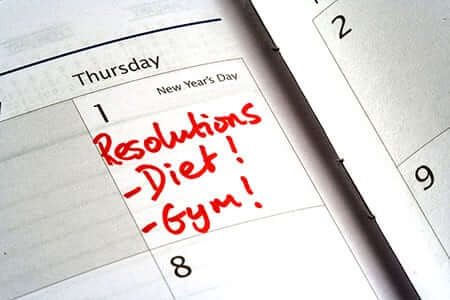Although we all have the best of intentions for the New Year, some resolutions are easier to accomplish than others; pushing for too many strict changes and perfection usually ends in frustration and disappointment. Try to stick to the diabetes basics this year and start with only two new goals at a time. When you can maintain these changes for three months, add another one. Remember, you are human and setbacks happen, along with possible burn-out; you may need a break. Diabetes management may never end, but try making changes in a simple and realistic way!
Reasonable and manageable resolutions for the New Year:
- Find an awesome internist or family practice doctor – sounds easy, but this doctor is the captain of your ship and the coordinator of all your care. Make sure they get your blood and test results along with medication changes from all the specialists. Tell them about your supplements and allergies including dietary ones like lactose intolerance. Make your own file.
- Test like a detective – blood sugar readings should be varied and not just taken fasting in the morning. Do not just rely on your A1C results which gives you no information about daily patterns. Test 2 hours after eating, before driving, when you are sick or do more exercise; test when your medication changes. Not all these times, just mix it up. Write them in a logbook or download them; do not rely on the memory button.
- Substitute your dinner plate size from 12 inches to 9 inches or even a salad plate – Load it up with non starchy vegetables, palm size lean protein and add a couple of servings of whole grain high fiber foods; best way for you to eat. Do not skip breakfast, ever! Combine foods – protein healthy fats, and carbohydrates for better blood sugars. Eat every 4-5 hours.
- Invest in a pedometer – research shows that this is a visual motivator and will help you get (someday) to the final goal of 10,000 steps a day, equal to 5 miles. Get there slowly but push on a little more each time you walk. If you have trouble walking, get into a heated pool. Just try to move, stand more then sit, fidget in your chair. Exercise uses sugar and will help lower your blood sugar numbers and reduce insulin resistance.
- Stash glucose tablets everywhere you might need them – car, purse, pocket, golf or bowling bag, night stand, gym bag. They are cheap, easy to carry and will help pull you out of hypoglycemia quickly. It only takes one time to have low blood sugar; you will never forget it if you are not prepared with a sugar source.
- Worry less about weight loss and just worry less about everything. Anxiety and stress will raise your blood sugar; research shows that most worries do not occur. Be ready if something needs your attention but do not waste time and energy on “what if?” Consider a form of relaxation like yoga, deep breathing or aromatherapy. Weigh one time a week to look for a trend; do not obsess. Worry more about your blood sugars.
- Take a diabetes self management class – check on the ADA or AADE websites and if you are lucky enough to have a class in your area, ask for a prescription. These classes DO make a difference on how you will take care of yourself; knowledge is power.
- Think and drink water – water is sugar, calorie, caffeine, and fat free and low sodium. Many people are slightly dehydrated most of the time and every cell needs water to help maintain your metabolism. Drink a glass before a meal to lessen your hunger. Skip calories in liquid form when you can – no fruit juice or regular soda.
Obviously, these are just a start to a better year for your diabetes management, but a good start. Do not forget about your teeth and gums, eyes or feet. Small changes now will eventually add up to feeling healthier in the future. Good luck!
NOTE: Consult your doctor first to make sure my recommendations fit your special health needs.













Leave A Comment